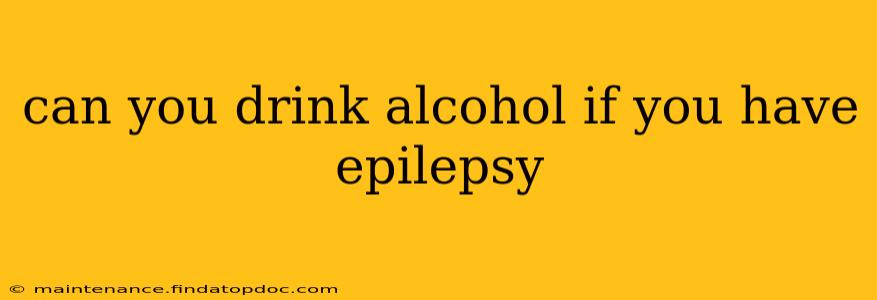Can You Drink Alcohol If You Have Epilepsy?
The short answer is: it's complicated, and generally not recommended. While there's no outright ban on alcohol for everyone with epilepsy, it's a significant risk factor that can worsen seizure control and overall health. The interaction between alcohol and epilepsy is complex and depends on several factors, making it crucial to discuss alcohol consumption with your neurologist or epileptologist.
Many individuals with epilepsy successfully manage their condition without completely abstaining from alcohol. However, the potential negative consequences need careful consideration. Let's delve into some frequently asked questions surrounding this topic.
What are the risks of drinking alcohol with epilepsy?
Alcohol can significantly impact the delicate balance needed to prevent seizures. Here's why:
- Seizure Triggers: Alcohol is a known seizure trigger for many people with epilepsy. It can lower the seizure threshold, making seizures more likely to occur. This risk is even higher if you have a history of alcohol-related seizures.
- Medication Interactions: Many epilepsy medications interact negatively with alcohol. This interaction can reduce the effectiveness of your medication, increasing your seizure risk. It can also lead to adverse side effects from the medication itself, making you feel unwell.
- Sleep Disruption: Alcohol disrupts sleep patterns, which are already often problematic for individuals with epilepsy. Sleep deprivation is a strong seizure trigger.
- Withdrawal Seizures: Suddenly stopping alcohol consumption after heavy drinking can trigger severe withdrawal symptoms, including seizures, even in individuals without a history of epilepsy. This is incredibly dangerous.
- Increased Risk of Injuries: Alcohol impairs judgment and coordination, increasing the risk of falls and head injuries during a seizure, potentially leading to severe complications.
- Overall Health Impacts: Alcohol is harmful to overall health, and individuals with epilepsy may already have health issues requiring careful attention. Alcohol consumption can exacerbate pre-existing problems.
Does the type of alcohol matter?
While the specific type of alcohol might not significantly alter the risk, the amount of alcohol consumed is crucial. Even small amounts can be problematic for some individuals. Higher alcohol content beverages generally pose a greater risk due to their faster absorption into the bloodstream.
How much alcohol is safe to drink if I have epilepsy?
There is no universally safe amount of alcohol for individuals with epilepsy. The tolerance varies greatly between individuals, influenced by the type of epilepsy, medication, genetics, and individual sensitivity. The safest approach is to avoid alcohol entirely. If you choose to drink despite the risks, it's essential to do so sparingly and under strict medical guidance. Your doctor can help determine if a very small amount of alcohol might be acceptable in your specific case.
Can alcohol withdrawal cause seizures in someone with epilepsy?
Yes, absolutely. Alcohol withdrawal can trigger seizures, even in those without a pre-existing seizure disorder. In individuals with epilepsy, alcohol withdrawal significantly increases the risk of seizures. The withdrawal process should always be managed under strict medical supervision.
Should I tell my doctor about my alcohol consumption if I have epilepsy?
Yes, absolutely. It's critical to be completely transparent with your neurologist or epileptologist about your alcohol consumption. They can assess your individual risk and help you make informed decisions about alcohol use. Open communication is crucial for effective management of your epilepsy.
What if I accidentally drink alcohol?
If you accidentally consume alcohol, monitor yourself closely for any changes in your condition. Pay attention to signs and symptoms of a seizure or other side effects. Contact your doctor immediately if you experience any concerns.
In conclusion, while some individuals with epilepsy may tolerate small amounts of alcohol without significant problems, it's a considerable risk that should not be taken lightly. The potential negative consequences, including increased seizure risk, medication interactions, and overall health issues, often outweigh any perceived benefits. Always consult with your healthcare provider before making any decisions about alcohol consumption. Open communication and a collaborative approach to management are essential for maintaining good health and controlling epilepsy.
